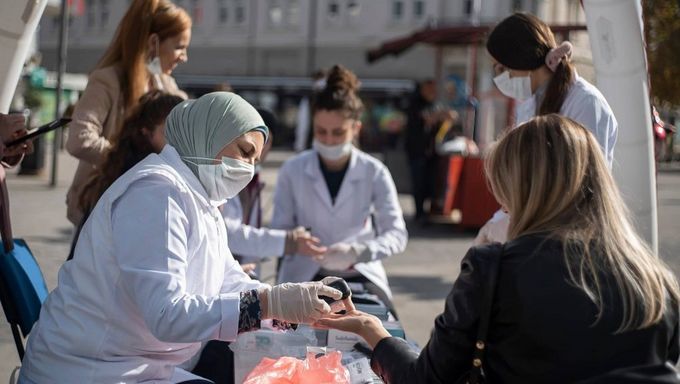Diabetes affects about half a billion people worldwide, most of them in low- and middle-income countries. Every year, 1.5 million deaths are directly attributed to diabetes, and both the number of cases and the prevalence of diabetes are constantly increasing. In Kosovo, diabetes is highly prevalent, yet often poorly controlled or undiagnosed. A new project funded by the Swiss Agency for Development and Cooperation (SDC) and implemented by Swiss TPH aims to tackle the burden of non-communicable diseases in Kosovo by supporting the development of a sustainable health system that provides high quality, affordable and integrated care for affected patients.

Access to quality diabetes education is crucial for healthcare teams as well as for people with diabetes, their caregivers and society in general.(Photo: AQH Project)
Kosovo presents some of the worst health indicators in South Eastern Europe. Despite the fact that the burden of non-communicable diseases (NCDs) in Kosovo is poorly documented, partly due to a not yet fully operational health information system, the high burden of disease is mirrored in the significantly lower life expectancy compared to neighbouring countries. A prospective cohort study on NCDs conducted by Swiss TPH in 2021 showed, for example, that rates of diabetes and hypertension are high in Kosovo, but often underdiagnosed and poorly controlled.
The Integrated Health Services (IHS) project aims to improve the availability, quality and continuity of care for patients with NCDs by strengthening related clinical, managerial and governance processes in two general hospitals, with a particular focus on the management of patients with diabetes and hypertension. Both diseases will serve as entry points to identify opportunities for quality improvement and health systems strengthening in the hospital setting. IHS is enhancing the coordination and referral between primary and secondary levels of care and supporting stakeholders at national level in developing and implementing a policy framework that promotes patient-centred integrated care.
The four-year IHS project is designed to complement the SDC’s Accessible Quality Healthcare (AQH) project, through which Swiss TPH has been supporting reforms in primary health care for more than seven years and will continue to do so. Both projects share the same mission of improving the quality of NCD care and cover more than half of Kosovo’s population with their interventions.
Improving referral of patients, clinical practice and patient participation
The Ministry of Health in Kosovo has identified the referral system as one of its reform priorities and both projects are very well placed to support actors at facility, sectoral and national levels in implementation. Whilst AQH focuses on primary health care, IHS is now in a position to support the secondary health care and policy development components of this reform. An effective referral system that incorporates high quality clinical and managerial practice will strengthen the role of family medicine and improve the quality of care at the hospital level.
“I am really excited that we can join forces with two major projects and work together with our national partners to strengthen the health system in Kosovo. We will support our partners not only in their NCD policy work, but also in prevention and care in health centers and hospitals, so that the right patient is treated in the right place at the right time by the right nurse and the right doctor,” said Jana Gerold, IHS and AQH Project Leader at Swiss TPH.
Both projects are based on the integrated people-centred health services approach. This concept includes the involvement of policy makers and planners, multidisciplinary working across the health sector, and the collaboration and active participation of citizens, patients and caregivers.
Quality diabetes education
Since people living with diabetes manage their own care in more than 95 per cent of cases, education about managing the disease is crucial. They need to understand their condition, know how to manage it and keep themselves informed.
The AQH project has successfully supported a range of different health education approaches for the public, patients and primary health care staff in the areas of diabetes prevention, diagnosis, clinical management and promotion of patient self-care. The new IHS project now provides an excellent opportunity to integrate diabetes education into primary care and hospitals so that clinical management of diabetes is coordinated and consistent, patients and caregivers are better informed about effective diabetes management, and ultimately the quality of patient care is improved.